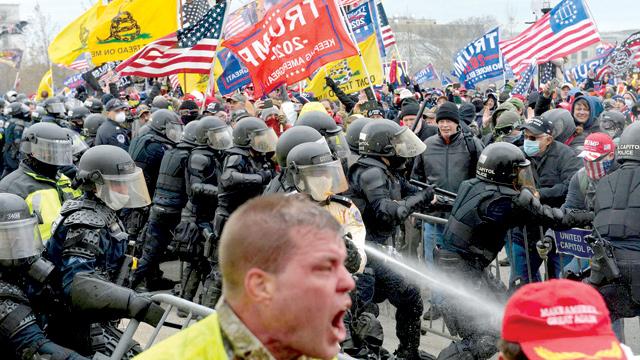- International News
- Web-2021-06-16 | 03:13 pm

Nayrouz News Agency :
The US government on Tuesday unveiled a "national strategy" to fight domestic terrorism, an effort ordered by President Joe Biden after the January 6 assault on Congress and attacks by white supremacists.
"Domestic terrorism — driven by hate, bigotry, and other forms of extremism — is a stain on the soul of America," Biden said in a statement.
"It goes against everything our country strives for and it poses a direct challenge to our national security, democracy and unity."
The White House said the threat of domestic terror attacks is not new but that it had grown in recent years, particularly from racially or ethnically motivated violent extremists and anti-government or anti-authority violent extremists.
Though law enforcement has said the primary threat is from the extreme right, and particularly armed militia groups, officials said the new strategy is "ideologically neutral".
The new strategy sets broad orientations rather than concrete measures, with the goals of "prevention, interruption and dissuasion" while preserving individual freedoms.
The Biden administration wants first to improve information sharing on extremist groups or individuals at the federal and local levels.
The Justice Department and the Federal Bureau of Investigation have set up a new nationwide system for reporting and tracking terrorism-related cases.
The government also wants to thwart the recruitment of violent extremists and calls for violence, in part by collaborating with large technology platforms and social media networks.
But it will not go as far as some members of Congress and law enforcement experts have urged, to create a distinct federal "domestic terrorism" crime.
Opponents worry that that could easily be abused as a tool against certain political groups.
Speaking on Tuesday, Attorney General Merrick Garland recalled recent attacks including the 2015 murder of nine African Americans by a white supremacist in a Charleston, South Carolina church, and the slaughter of eleven Jews in a Pittsburgh synagogue by an anti-Semitic extremist.
"Our current effort comes on the heels of another large and heinous attack, this time the January 6 assault on our nation's capitol," he said.
On January 6 hundreds of supporters of then-president Donald Trump, many associated with ultra-nationalist and white supremacist groups, stormed the US legislature to halt the confirmation of Biden as the next president.
Garland said the Justice Department had arrested more than 480 people in that case.
"We have now... an enormous task ahead to move forward as a country to punish the perpetrators, to do everything possible to prevent similar attacks, and to do so in a manner that affirms the values on which our justice system is founded, and upon which our democracy depends," he said.
The move followed Washington's announcement in May that it was joining the Christchurch Call, an international movement against the online dissemination of extremist content, which Trump had refused to join.
That initiative grew out of the March 15, 2019 massacre of 51 Muslims in two mosques in the New Zealand city by a follower of European extreme-right racist groups.
The Biden adminstration's strategy comes as FBI investigations into "domestic terrorism" doubled from 1,000 cases to 2,000 since 2017.
The problem, the White House said, has some roots in economic inequality, people who feel left behind by the 21st century economy, structural racism and the proliferation of guns.
"We have to take both short-term steps to counter the very real threats of today and longer-term measures to diminish the drivers that will contribute to this ongoing challenge to our democracy," said Biden in a statement.













